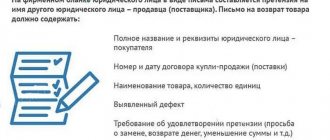Regulated issues art. 24 ZPPP: brief description and essence
The indicated Law explains the conditions under which the settlement of such an issue as the transfer of goods of dubious quality to the consumer is made, namely:
- In situations where a purchased item of inadequate quality is replaced, the price is not recalculated.
- If a product of poor quality is replaced with an analogue product, but more expensive, the buyer undertakes to make an additional payment for the resulting difference in price. When the cost of the replaced item of purchase is exceeded, the amount will need to be returned to the consumer.
- If there is a requirement for proportionality in the reduction of the purchase price, the calculation must be made at a price corresponding to the current one. This applies to the issue of voluntary discounting of an item or by a court decision, if such an action was not agreed upon by the parties.
- In paragraph 4 of Art. 24 of the PZPP also provides for such a situation as the return of a purchase that does not meet the quality. The buyer has the opportunity to request compensation for the difference between the price approved in the document drawn up and the price certified at the time the request was satisfied. The same opportunity under clause 4 of the PPA is provided to the buyer in a situation where the seller does not fulfill the requirements identified after the decision made by the judicial authority.
- Clause 24 of the PZPP provides for the return of money if goods were sold on credit. That is, when a purchased purchase of inadequate quality is returned, the seller undertakes to return the payment made to the buyer, and the amounts that are the payment for issuing the loan in the form of accrued interest are also returned.
It is worth noting that Article 24 of the PPA regulates issues not only to protect the consumer, but also the seller. The law states that it is impossible to recalculate the price if we are talking about an interchangeable item of dubious quality. This possibility is allowed when, from the moment of transfer until the day the replacement was made, the pricing policy changed or the item purchased was sold at a discount. Although such an act is not entirely legal and is a prerequisite for contacting Rospotrebnadzor.
Compensation for the difference in price (or, more precisely, an additional payment or refund of the amount) is possible in the case when, if it is necessary to replace the product, the seller does not have the same one, but he is ready to provide a similar item, but of a different brand and at a higher price, and the buyer agrees to accept it . This option provides for the fact of additional payment for the provided unit. If the replacement analogue is cheaper, then the buyer has the right to return the difference from the previously paid amount.
Replace the product with a similar one with recalculation
According to the second point, in the case of exchanging a purchase for the same, but different brand (model, article), the issue of price discrepancy is resolved simply: if the new item is more expensive than the one being returned, the buyer pays the difference; if it is cheaper, the seller reimburses it. In this case, the cost of a low-quality product is determined not at the time of its purchase, but depending on the voluntariness of the seller’s fulfillment of the buyer’s requirements:
- if the replacement is made voluntarily , the price is determined on the day of exchange;
- if the seller refused to satisfy the demand , and the issue was resolved through the court, the price will be determined on the day of the court decision.
Interaction with other rules of law
The legislation regulating market relations between seller and buyer provides for a fairly large list of articles that are directly related.
Regulatory acts interconnected
| article number | content | name of the law | percentage |
| 19 | deadlines for the consumer to report claims regarding product defects | Law on Protection of Consumer Rights | 26 |
| 22 | deadlines for consideration of individual buyer requirements | 26 | |
| 21 | replacement of products of inadequate quality | 19 | |
| 18 | consumer rights when identifying defects in a product | 57 | |
| 25 | consumer's right to replace goods of inadequate quality | 16 | |
| 14 | financial liability for damage caused due to defects in goods (work, services) | 14 |
Federal Law of April 24, 2020 No. 124-FZ
RUSSIAN FEDERATION
THE FEDERAL LAW
On amendments to certain legislative acts of the Russian Federation on issues of ensuring sustainable economic development in the context of a worsening situation due to the spread of a new coronavirus infection
Adopted by the State Duma on April 17, 2021
Approved by the Federation Council on April 17, 2021
Article 1
Introduce into the Federal Law of July 18, 2011 No. 223-FZ “On the procurement of goods, works, services by certain types of legal entities” (Collected Legislation of the Russian Federation, 2011, No. 30, Art. 4571; 2012, No. 53, Art. 7649; 2013, No. 52, Art. 6961; 2015, No. 27, Art. 3947; 2021, No. 15, Art. 2066; 2021, No. 1, Art. 65, 89; 2021, No. 31, Art. 4422) the following changes:
1) Part 1 of Article 35, after the words “constitute a state secret,” add the words “or if such a purchase is carried out as part of the implementation of a state defense order in order to ensure the defense and security of the Russian Federation in terms of orders for the creation, modernization, supply, repair, maintenance and disposal of weapons, military and special equipment, for the development, production and supply of space technology and space infrastructure facilities,”;
2) paragraph one of part 15 of article 4, after the words “constituting a state secret,” add the words “information on procurement carried out as part of the implementation of the state defense order in order to ensure the defense and security of the Russian Federation in terms of orders for the creation, modernization, supply, repair, servicing and disposal of weapons, military and special equipment, for the development, production and supply of space technology and space infrastructure facilities.”
Article 2
Introduce into the Federal Law of April 5, 2013 No. 44-FZ “On the contract system in the field of procurement of goods, works, services to meet state and municipal needs” (Collected Legislation of the Russian Federation, 2013, No. 14, Art. 1652; No. 27, Art. 3480; No. 52, Art. 6961; 2014, No. 23, Art. 2925; No. 30, Art. 4225; No. 48, Art. 6637; No. 49, Art. 6925; 2015, No. 1, Art. 11, 51, 72; No. 10, Art. 1418; No. 27, Art. 4001; No. 29, Art. 4342, 4353, 4375; 2021, No. 1, Art. 10, 89; No. 11, Art. 1493; No. 15, Art. 2058; No. 23, Art. 3291; No. 27, Art. 4253, 4254, 4298; 2021, No. 1, Art. 15, 30, 41; No. 9, Art. 1277; No. 14, Art. 2004; No. 18, Art. 2660; No. 24, Art. 3475, 3477; No. 31, Art. 4747, 4780, 4816; 2021, No. 1, Art. 59, 87, 88, 90; No. 18, Art. 2578; No. 27 , Art. 3957; No. 31, Art. 4861; No. 45, Art. 6848; No. 53, Art. 8428, 8444; 2019, No. 18, Art. 2194, 2195; No. 52, Art. 7767, 7787; 2021, No. 9, Article 1119; Rossiyskaya Gazeta, 2021, April 3; April 6) the following changes:
1) Article 2 shall be supplemented with part 5 as follows:
"5. Federal laws amending the provisions of this Federal Law regarding planning of procurement of goods, works, services, identification of suppliers (contractors, performers), including the establishment of new ways of identifying suppliers (contractors, performers), control in the field of procurement, monitoring of purchases of goods , works, services, audit in the field of procurement of goods, works, services, come into force on January 1 of the next calendar year following the year of their adoption, with the exception of cases of their adoption after October 1 of the current calendar year, in which such federal laws come into force effective from January 1 of the year following the next calendar year.”;
2) in part 8 of Article 31, the words “clause 1” are replaced with the words “clauses 1 and 71”, the numbers “7 - 9” are replaced with the numbers “7, 8, 9”;
3) in paragraph 1 of Part 13 of Article 34, the words “with Part 4 of Article 33 of this Federal Law of requirements for their provision” should be replaced with the words “with Article 96 of this Federal Law of requirements for securing warranty obligations”;
4) in Part 11 of Article 45, replace the words “Russian credit organization” with the word “bank”;
5) in paragraph 4 of part 1 of Article 93, the word “three hundred” is replaced by the word “six hundred”, the words “five percent” are replaced by the words “ten percent”;
6) in Article 96:
a) in Part 1, the words “ensuring warranty obligations in the event of establishing requirements for such obligations in accordance with Part 4 of Article 33 of this Federal Law” shall be deleted;
b) add part 22 with the following content:
"22. The customer has the right to establish in the notice of procurement, procurement documentation, draft contract, invitation to participate in the determination of a supplier (contractor, performer) in a closed way the requirement to ensure warranty obligations in the event of establishing requirements for such obligations in accordance with Part 4 of Article 33 of this Federal Law . The amount of security for guarantee obligations cannot exceed ten percent of the initial (maximum) contract price.”;
c) part 6 should be stated as follows:
"6. If the customer establishes, in accordance with this article, a requirement for security for the execution of the contract, the amount of such security is established in accordance with this Federal Law in the notice of procurement, procurement documentation, draft contract, invitation to participate in determining the supplier (contractor, performer) in a closed manner in in the amount of one-half percent to thirty percent of the initial (maximum) contract price, except for the cases provided for in parts 61 and 62 of this article. Moreover, if:
1) the contract provides for the payment of an advance, the amount of security for the performance of the contract is established in no less than the amount of the advance, except for the case provided for in paragraph 3 of this part;
2) the advance exceeds thirty percent of the initial (maximum) contract price, the amount of security for the performance of the contract is established in the amount of the advance;
3) in accordance with the legislation of the Russian Federation, settlements under the contract in terms of advance payment are subject to treasury support, the amount of security for the execution of the contract is established by the customer from the initial (maximum) contract price (from the contract price in the case provided for in part 62 of this article when concluding a contract based on the results of determining suppliers (contractors, performers) in accordance with paragraph 1 of part 1 of Article 30 of this Federal Law), reduced by the amount of such advance.”;
d) add parts 61 - 63 with the following content:
"61. If, in accordance with the legislation of the Russian Federation, settlements under a contract are subject to treasury support, the customer has the right not to establish a requirement to ensure the execution of the contract. Moreover, if the customer establishes a requirement for security for the execution of the contract, the amount of such security is set at up to ten percent of the initial (maximum) contract price (of the contract price in the case provided for in Part 62 of this article when concluding a contract based on the results of determining the supplier (contractor, performer) in accordance with paragraph 1 of part 1 of article 30 of this Federal Law).
62. If a contract is concluded based on the results of identifying a supplier (contractor, performer) in accordance with paragraph 1 of part 1 of Article 30 of this Federal Law and the customer has established a requirement to secure the execution of the contract, the amount of such security is established in accordance with parts 6 and 61 of this article from the contract price , under which a contract is concluded in accordance with this Federal Law.
63. If the price, the sum of prices of units of goods, work, services proposed in the application of a procurement participant is reduced by twenty-five percent or more in relation to the initial (maximum) price of the contract, the initial sum of prices of units of goods, work, services, the procurement participant , with whom the contract is concluded, provides security for the execution of the contract, taking into account the provisions of Article 37 of this Federal Law.”;
e) in part 73, the first sentence should be supplemented with the words “or in an amount exceeding the advance paid (if, in accordance with the legislation of the Russian Federation, settlements under the contract regarding the payment of the advance are subject to treasury support)”;
7) paragraph one of part 65 of Article 112 after the words “Article 22 of this Federal Law)” shall be supplemented with the words “and (or) the amount of the advance (if the contract provides for the payment of an advance)”, after the words “local administration” shall be supplemented with the words “(except in the case of changes in the amount of the advance in accordance with this part).”
Article 3
Amend the Federal Law of December 27, 2021 No. 449-FZ “On Amendments to the Federal Law “On the Contract System in the Sphere of Procurement of Goods, Works, Services to Meet State and Municipal Needs” (Collected Legislation of the Russian Federation, 2021, No. 52, Article 7767) the following changes:
1) in article 1:
a) subparagraph “b” of paragraph 20 should be stated as follows:
“b) in Part 9, the words “request for quotation in electronic form or” should be deleted, the words “protocols specified in Part 8 of Article 824, Part 23 of Article 831 of this Federal Law” replaced with the words “protocol specified in Part 23 of Article 831 of this Federal Law”, add a sentence with the following content: “When making a purchase by requesting quotations in electronic form, the contract may be concluded no earlier than the period provided for in paragraph 4 of part 13 of Article 821 of this Federal Law.”;”;
b) in paragraph 23:
in paragraph two of subparagraph “a” the word “three hundred” should be replaced with the word “six hundred”;
in subparagraph “c”:
in paragraph thirty-one after the word “price”, add the word “(prices)”, add the words “, provided for in subparagraphs “g” and “h” of this paragraph, the quantity of goods offered by the procurement participant for supply, and the subject (subjects) of the Russian Federation, municipal ( municipal) district (districts) or city district (districts), within the territory (territories) of which the procurement participant offers goods for delivery”;
in paragraph thirty-two, replace the word “maximum” with the words “minimum and (or) maximum”, the word “supplies;” replace with the words “supplies. In this case, such quantity of goods may be indicated taking into account the subject (subjects) of the Russian Federation, municipal (municipal) district (districts) or city district (districts) provided for in subparagraph “h” of this paragraph, within the territory (territories) of which ( which) the procurement participant offers the goods for delivery;”;
add a new paragraph thirty-six as follows:
“k) minimum (minimum) period (terms) and (or) maximum (maximum) term (terms) for delivery of goods, taking into account the quantity of goods proposed by the procurement participant for supply, and the subject ( subjects) of the Russian Federation, municipal (municipal) district (districts) or city (city) district (districts), within the territory (territories) of which the procurement participant offers goods for delivery. The delivery times for goods provided for in this subclause are calculated in calendar days and are indicated in the preliminary proposal in calendar days. In this case, failure to indicate the minimum (minimum) or maximum (maximum) period(s) in accordance with this subclause means the procurement participant’s agreement with the delivery time of the goods provided for in the notice of procurement in accordance with subclause “c” of clause 3 of this part;”;
paragraph thirty-six shall be considered paragraph thirty-seven and in it the words “clause 5 of this part;” replace with the words “clause 5 of this part. The procurement participant, in the manner established by paragraph 1 of this part for the formation and placement of a preliminary proposal, has the right to make changes to the preliminary proposal. Moreover, such changes apply to relations related to participation in procurement, notices of the implementation of which are posted in the unified information system after such changes are posted on the electronic platform;”;
paragraphs thirty-seven - thirty-nine shall be considered paragraphs thirty-eight - forty, respectively;
The fortieth paragraph shall be considered the forty-first paragraph and in it after the word “indicators,” add the words “term and” and the word “composition;” replace with the words “composition. The delivery time for goods provided for in this subclause is calculated in calendar days and is indicated in the notice of purchase in calendar days;”;
paragraphs forty-one - forty-five shall be considered paragraphs forty-second - forty-six, respectively;
paragraph forty-six shall be considered paragraph forty-seven and in it the words “object of procurement;” replace with the words “object of procurement. At the same time, when determining such applications, applications of procurement participants who do not have a quantity of goods not blocked in accordance with subparagraph “d” of this paragraph in the amount of the quantity of purchased goods provided for in the notice of procurement in accordance with subparagraph “c” of paragraph 3 of this paragraph are not taken into account parts;";
paragraphs forty-seven and forty-eight shall be considered paragraphs forty-eight and forty-nine, respectively;
add a new paragraph fiftieth as follows:
“d) if a procurement participant indicates in a preliminary proposal in accordance with subparagraph “g” of paragraph 1 of this part the maximum quantity of goods, it blocks the quantity of goods indicated in accordance with such subparagraph in the preliminary proposal of each procurement participant whose application was sent in accordance with subparagraph “ c" of this paragraph, in the amount provided for in the notice of purchase in accordance with subparagraph "c" of paragraph 3 of this part of the quantity of goods purchased;";
paragraphs forty-nine - fifty-five shall be considered paragraphs fifty-one - fifty-seven, respectively;
paragraph fifty-six shall be considered paragraph fifty-eight and in it the word “is carried out.” replace with the word “carried out;”;
add paragraphs fifty-nine to sixty-one as follows:
“9) if, in accordance with subparagraph “g” of paragraph 1 of this part, the procurement participant whose application is sent to the customer in accordance with subparagraph “c” of paragraph 5 of this part is indicated in the preliminary offer of the maximum quantity of goods, the operator of the electronic platform no later than one hour from moment:
a) placement in accordance with subparagraph “c” of paragraph 6 of this part of the protocol for summing up the determination of the supplier stops blocking the quantity of goods, carried out in accordance with subparagraph “d” of paragraph 5 of this part, of procurement participants, with the exception of the procurement participant with whom, in accordance with a contract is concluded by this Federal Law;
b) conclusion of a contract in accordance with this Federal Law automatically reduces the quantity of goods specified in the preliminary proposal of the procurement participant with whom the contract is concluded, provided for in subparagraph “g” of paragraph 1 of this part, by the quantity of purchased goods provided for in the notice of procurement in accordance with subparagraph “c” of paragraph 3 of this part.”;
paragraph fifty-seven shall be considered paragraph sixty-two;
2) in article 2:
a) part 3 should be stated as follows:
"3. Paragraphs 5, 11 and 13, subparagraph "b" of paragraph 19, paragraphs six - tenth of subparagraph "a", paragraphs one - twenty-third of subparagraph "c" of paragraph 23, subparagraph "d" of paragraph 24, paragraph 26 of Article 1 of this Federal Law come into force effective from July 1, 2021.”;
b) add part 31 with the following content:
"31. Subparagraph “c” of paragraph 2, paragraphs 3 and 4, subparagraph “a” of paragraph 7, paragraphs 8, 16, 17, paragraph two of subparagraph “a”, subparagraph “b” of paragraph 20, paragraphs two, third of subparagraph “a”, subparagraph “b”, paragraphs twenty-four - sixty-two of subparagraph “c” of paragraph 23, paragraphs 25 and 27 of Article 1 of this Federal Law come into force on October 1, 2021.”;
c) in part 4, replace the words “January 1” with the words “July 1”.
Article 4
If in 2021, in order to ensure the sanitary and epidemiological well-being of the population on the territory of the Russian Federation in connection with the spread of the new coronavirus infection caused by 2019-nCoV, the President of the Russian Federation decided to establish non-working days, then during such non-working days:
1) the terms provided for by the Federal Law of July 18, 2011 No. 223-FZ “On the procurement of goods, works, services by certain types of legal entities”, adopted in accordance with it by regulatory legal acts, calculated in working days, are subject to calculation in calendar days. In this case, Saturday and Sunday are not taken into account when calculating the periods subject to calculation in accordance with this paragraph;
2) if the last day of the period calculated in accordance with the Federal Law of July 18, 2011 No. 223-FZ “On the procurement of goods, works, services by certain types of legal entities”, adopted in accordance with the regulatory legal acts, falls on a non-working day, the end date of the period is considered to be such a non-working day, except for cases where the last day of the term falls on a Saturday, Sunday or a non-working holiday (in which case the end day of the period is considered to be the next next non-working day that is not a Saturday, Sunday or a non-working holiday).
Article 5
1. This Federal Law comes into force on the date of its official publication, with the exception of provisions for which this article establishes other dates for their entry into force.
2. Paragraphs 3 and 6 of Article 2 of this Federal Law come into force on July 1, 2021.
3. Paragraphs 1 and 2 of Article 2 of this Federal Law come into force on January 1, 2021.
4. The provisions of paragraph 1 of part 13 of article 34, parts 1, 22, 6 - 63 and 73 of article 96 of the Federal Law of April 5, 2013 No. 44-FZ “On the contract system in the field of procurement of goods, works, services for the provision of state and municipal needs" (as amended by this Federal Law), by agreement of the parties to the contract, may extend to relations related to the execution of a contract concluded before the date of entry into force of this Federal Law, or a contract concluded based on the results of determining the supplier (contractor, performer), notice of implementation procurements for which are posted in the unified information system in the field of procurement or invitations to participate in procurements for which were sent before the entry into force of this Federal Law.
President of the Russian Federation V. Putin
Moscow Kremlin
April 24, 2021
No. 124-FZ
Judicial practice under Art. 24 ZPP
The court considered the case on the basis of a stated claim from O.V. Ibragimov, who asked to satisfy his request to compensate for the losses caused, penalties, fines and moral damages. The bottom line is that Ibragimov O.V. I bought an expensive phone (the deal was completed according to all the rules), but after 2 years of use, the purchased device malfunctioned. The plaintiff contacted the salon where the smartphone was purchased with a request to fix the problems, to which the seller of the device agreed. However, Ibragimov O.V. did not provide the goods. The defendant sent the plaintiff a telegram notification, which was also not responded to.
The arguments presented to the judicial authority were considered, and on the basis of them the court decided to refuse O.V. Ibragimov. in satisfying his requests regarding the defendant, guided by the legal norms of the Civil Code of the Russian Federation and the Civil Code of the Russian Federation, which states that:
- When completing a purchase and sale transaction, the participants undertake: the seller - to provide a quality product in accordance with the conditions specified in the contract, and the consumer, of course, to pay its cost.
- In addition, it is indicated that the seller undertakes to eliminate any problems that have arisen in accordance with the same agreement upon making the purchase. In this case, the seller agreed, but the plaintiff ignored this possibility.
- The seller also sent a telegram notification to the consumer, who also ignored it, and accordingly, he missed the opportunity to fix the problems free of charge.
- Among the evidence there was no documentary evidence that the problems appeared 2 years later due to the fault of the manufacturer.

Based on such arguments, the court decided to refuse the applicant’s demands, since by his actions he rejected the possibility of solving the problem of the purchased goods.
Grounds for refusal to initiate criminal proceedings or termination of criminal proceedings
Chapter 4 of the procedural code is devoted to the issue raised.
The first part of Article 24 specifies the following grounds for refusal to initiate criminal proceedings:
- Non-existence of a criminal event in reality. In other words, the incident was wrongly considered criminal and did not exist at all.
- The lack of a link in the unlawful incident is the insanity of the offender, slight danger, execution under the threat of physical harm, in case of necessity or defense, the perpetrator has not reached the age of responsibility.
- Termination of the statute of limitations for criminal prosecution. Directly depends on the severity of the offense. The more serious the criminal violation, the more time is given to bring the perpetrator to justice.
- In the event of the death of a criminal person. The exception here is cases designed to rehabilitate the deceased.
- Lack of a victim’s statement if the criminal investigation is initiated solely in the presence of such a complaint. We are talking about protecting the interests of citizens who do not have the opportunity to independently defend their own interests due to the mentally unhealthy, dependent, well-being of the victim.
- If the court does not find indicators of the criminal segment in the behavior of the Prosecutor General of the Russian Federation or the Chairman of the Investigative Committee of Russia. What is there a formalized act of expression of will about?
The second component of the norm indicates that if, before the sentence enters into legal force, the criminality of the event is excluded by a newly adopted act, then this is recognized as a reason for liquidating the criminal case.
The next thing that is said is that if the criminal case is terminated, the prosecution of the perpetrator also stops.
The conclusion indicates the basis for ending the criminal record in cases where the criminal prosecution of the person is cancelled. The exception here is the lack of involvement of the suspect. In this case, the investigation continues and the goal is to find another culprit. Part of the Federal Law came into force in 2003.
The law prescribes the procedure for initiating a criminal investigation, consisting of the stage of registering a received message, its consideration and further decision-making, any of which is subject to documentation in an appropriate form. It is mandatory to notify the applicant of the conclusions reached by the employee who received this application. It is not possible to refuse to receive information.
A complete analysis of the information provides grounds for one of several actions - to initiate a criminal investigation, refuse it, or refer it according to jurisdiction. Any decision can be appealed in accordance with the established procedure. The step-by-step appeal process must be explained to the applicant.
Existing nuances
To the significant nuances of Art. 4 of the Law on Protection of Consumer Rights includes the following facts:
- The buyer does not pay the difference in cost if the purchased product is replaced with an analogue without any defects.
- If the buyer wishes to return the item of his purchase and request a return of the money paid, then if the price of the product changes upward, the seller undertakes to return the paid amount plus the difference between the indicated price and the new one.
The presented article protects to a large extent the rights of the buyer, since this party to the purchase and sale transaction may demand replacement, return of low-quality goods and receive an additional payment if its price has increased during the time of requesting a return.








